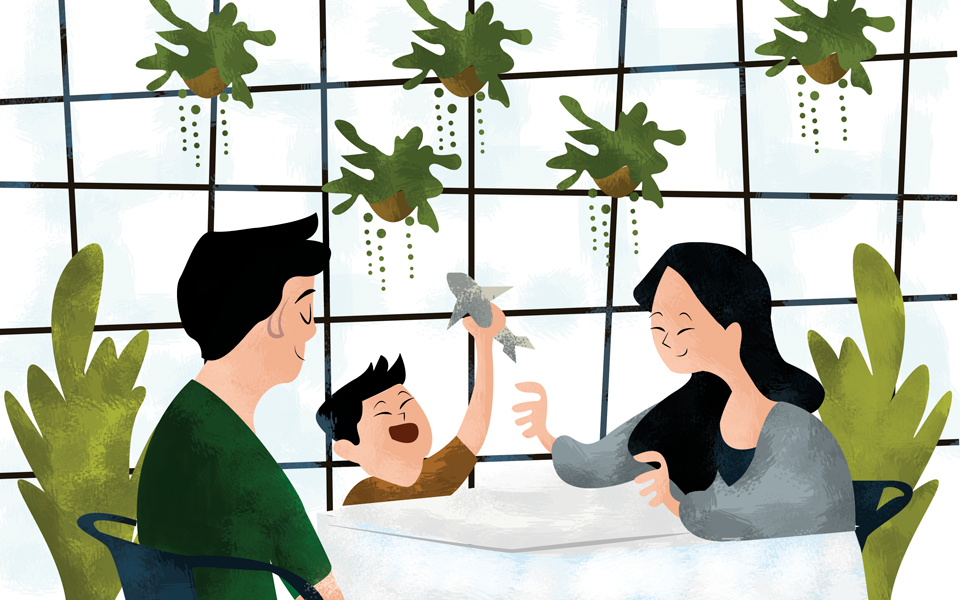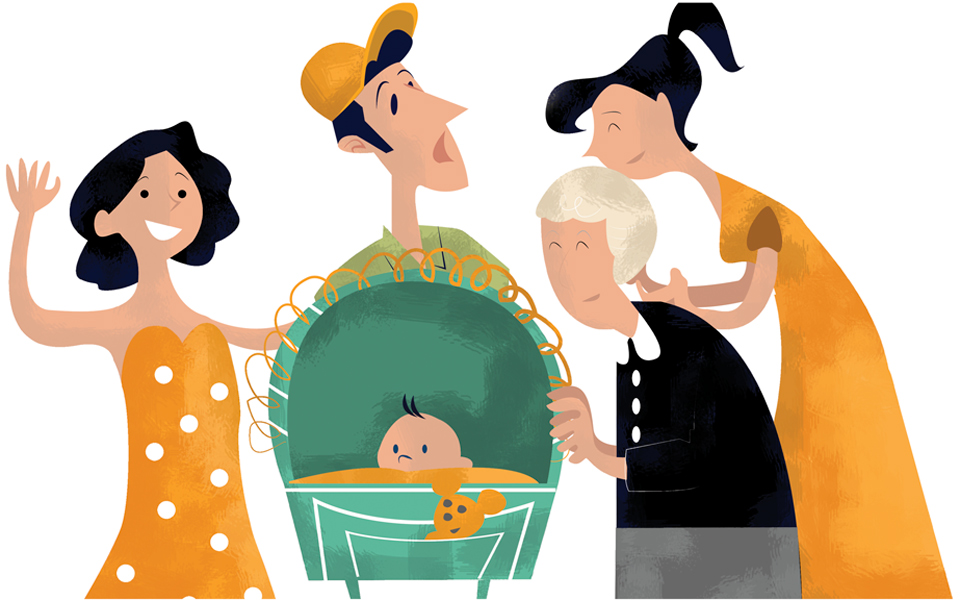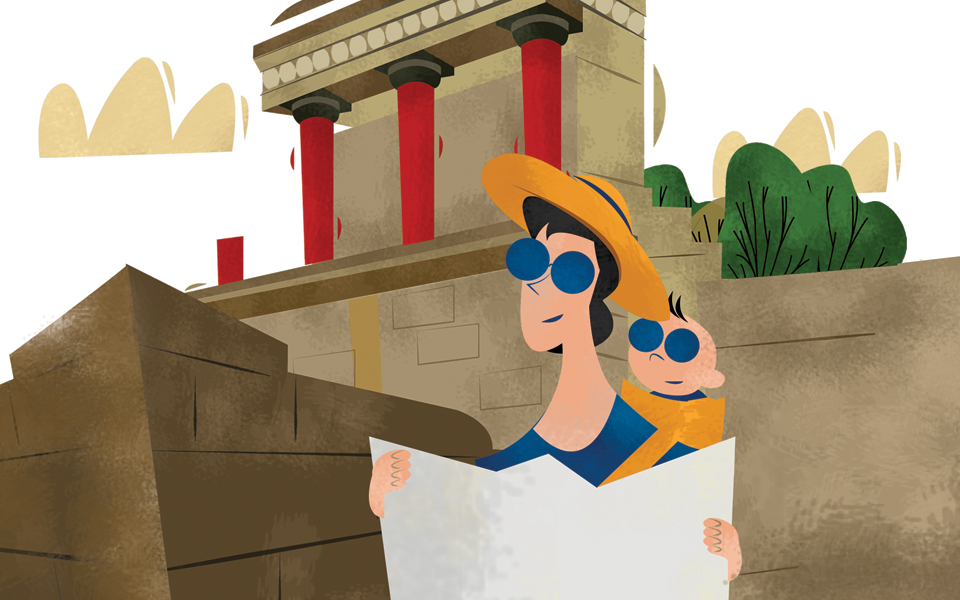Greece is a baby-friendly country when it comes to the attitude of the people. The summer climate makes it very pleasant for young children. If you want your pride and joy to experience a little dip in the sea for the first time, then you can’t go wrong with the country’s plentiful beaches and their warm waters.
Furthermore, a total of 395 beaches in Greece have been awarded Blue Flag certification which indicates, among other things, that the water is clean and of good quality.
“When it comes to cute little babies, Greeks, especially the older generation, just can’t help themselves. ”
If you are considering a trip to Greece for your baby’s first holiday, here’s what you need to know:
What equipment should I bring?
The footpaths and streets of the country are pretty dismal when it comes to using a stroller, so you’ll fare better if you have air-filled tires. Otherwise, bring along a baby sling too. This will help you wander the side streets of Plaka and the narrow alleyways of the smaller islands with no trouble. Most hotels provide a cot for babies and small children.
Can I breastfeed in public?
Yes, you can. The general attitude towards breastfeeding in Greece is friendly and if you let staff know in advance, they will try to seat you in a part of the restaurant where you and your child won’t be disturbed by patrons constantly passing by. For smaller islands and villages which might be more conservative, a little discretion is advised. For formula-fed babies, I’ve often found that restaurant staff are more than happy to rinse out feeding bottles for you, and will usually bring it back sterilized to boot. For older babies, requests for warming baby food will be met without question.
Should I bring baby formula or buy it in Greece?
Depending on where you come from, it’s better to carry your supply of formula with you. Baby formulas sold in Greece at the supermarket or pharmacy tend to carry a more inflated price tag than some other European countries.

© Phlippos Avramides
Can I bring a baby to a restaurant?
Yes. Most restaurants and taverns will welcome babies and young children without question, although you might not always find a highchair at hand. If you plan on a fine dining experience, it might be better to leave your child with a babysitter, or time your visit with one of their naps, as you would do back home if you were going out. For such establishments, check beforehand.
Where are the changing tables?
As baby-friendly as Greece is, the practice of leaving small children with the grandparents is so widespread that most establishments don’t factor in visitors who might have a baby in need of a diaper change.
And so, the hunt for the mystical tavern with a changing table is a never ending struggle. The newer shopping malls such as Golden Hall, Athens Metro Mall and The Mall Athens all have changing tables in the bathrooms. If you find yourself caught out, ask staff to direct you to where you can change a diaper in peace.
What about public displays of affection towards my baby?
When it comes to cute little babies, Greeks, especially the older generation, just can’t help themselves. Don’t be surprised if perfect strangers come up to you to tickle your baby’s chubby thighs or chat to them, even though they know neither of you. Sometimes, the admiration of your child might be followed by the other person uttering a “ftou-ftou” sound as if spitting. This is something which is meant to ward away the evil eye and usually delivered after lavish praise has been bestowed on someone. I wish I had some advice to give you if you’d prefer this sort of thing didn’t happen, but to be perfectly honest there is nothing you can do to stop a Greek yiayia when she has a cute baby in her sights. No harm is meant.
“If you’ve ever wondered what being famous must be like – no queues, tables immediately located for you at the restaurant, freebies galore – visiting Greece with a baby will give you a pretty good insight. ”

© Philippos Avramides
Why is everyone giving my baby stuff?
If you’ve ever wondered what being famous must be like – no queues, tables immediately located for you at the restaurant, freebies galore – visiting Greece with a baby will give you a pretty good insight. Walk into any bakery and expect to be handed a cookie, rusk, biscuit, sweet or anything else the proprietor has on hand to spoil your little one. Religious charms and ‘mati’ trinkets are also often shoved into the hands of parents to ensure their loved one stays protected by the powers that be. In the countryside, stop to admire a farmer’s chickens and you’ll find yourself in possession of a few eggs of your own, along with instructions to feed the child “real eggs, Greek eggs from happy chickens, not like the ones you get in the city!” Don’t resist, just smile and accept even if your child is too young for the goodies. It might be a new experience for you to be fussed over like this, and if you’re a private person, it might feel a little intrusive. Remember that it’s all done with affection; Greeks just love babies.
What if I need a pharmacy?
There are quite a lot of pharmacies in big cities and at least one in smaller villages. Medication tends to be quite affordable in Greece. However, if your child is taking a specific kind of medication for something less run-of-the-mill, make sure you bring an adequate supply just in case you end up in a village or on an island where the pharmacy might not be stocked with less known items. Every area has at least one pharmacy which is on 24 hour duty each day. The shift lists are posted on the windows of all pharmacies in Greek. Alternatively, on-call pharmacies are listed online too (also in Greek), and hotel staff will be able to direct you to the right one to visit.
Is there a hospital where I’m going?
In larger cities, there is always a hospital on-call in rotating 24 hour shifts. Bear in mind that on small islands and more remote locations, health centers usually operate in lieu of fully functioning hospitals, and are not open 24/7. They can tend to minor emergencies, but if you want to play it safe, choose an island with an airport (even if you make your way there by ferry) just to have the peace of mind that in the face of a medical complication popping up unexpectedly, you are a short flight away from a larger city. Even some of the tiniest islands like Astypalaia and Kastellorizo operate airports. Public hospitals can often be chaotic and short-staffed, but if you don’t mind waiting to be seen, they get the job done. Alternatively, book travel insurance along with your ticket or pay out of pocket – a typical appointment with a private doctor costs around 30-50 euros, and private health insurance should cover a visit to a private hospital.
“Walk into any bakery and expect to be handed a cookie, rusk, biscuit, sweet or anything else the proprietor has on hand to spoil your little one.”











